Digital Poster
Progress in Understanding Parkinson’s Disease
ISMRM & ISMRT Annual Meeting & Exhibition • 10-15 May 2025 • Honolulu, Hawai'i

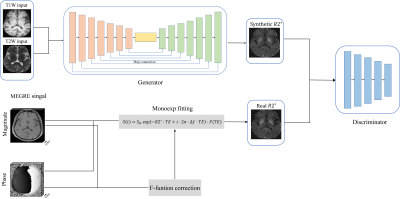 |
Computer Number: 113
4697. Quantitative
R2∗ Map Synthesis from T1W and T2W Images Using Generative
Adversarial Networks for Parkinson's Disease
J. Wu, C. Xiong, Y. Yang, W. Sun, Y. Liu, P. Wang, A. Liu,
Y. Yang, C. Niu, W. Wei, J. Wen
The First Affiliated Hospital of USTC, Division of Life Sciences and Medicine, University of Science and Technology of China, Hefei, Anhui, China
Impact: The generated R2* maps show good correlations
with real R2* maps and have the potential to provide
valuable information about the disease process. Our study
provides a promising start for PD diagnosis, assessment and
monitoring using synthetic R2* maps.
|
|
 |
Computer Number: 114
4698. Dual-Rater
Noise Compensation in UPDRS Improvements from Deep Brain
Stimulation via Quantitative Susceptibility Mapping Outcome
Prediction
A. Roberts, C. Tozlu, S. Akkus, P. Spincemaille, B. Kopell,
Y. Wang
Cornell University, New York, United States
Impact: The introduced noise compensated radiomic model
allows for predictions on datasets with more than one rater,
reflecting a clinically relevant setting in which candidate
selection can be improved.
|
|
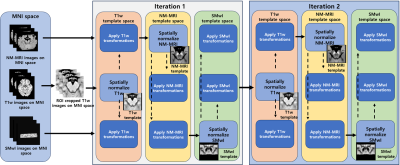 |
Computer Number: 115
4699. Development
of template construction pipeline for NM-MRI and SMwI images
J. Jo, H. Heo, M. O. Lee, I. Shin, M. S. Kim, S. J. Chung,
S. Y. Kang, S. Song
Heuron, Seoul, Korea, Republic of
Impact: By constructing the high quality template of
NM-MRI and SMwI, atlas-based analysis can be used to NM-MRI
and SMwI.
|
|
|
Computer Number:
4700. WITHDRAWN |
||
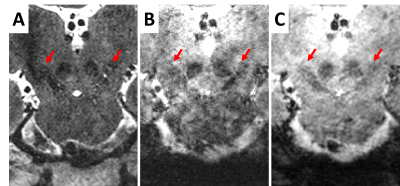 |
Computer Number: 116
4701. Fast
Imaging of the Subthalamic Nucleus (STN) at 7T
S-H Oh, V. Zapata-Amaya, D. Escobar, S. Jones, K. Sakaie, S.
Nagel, M. Lowe
Hankuk University, Seoul, Korea, Republic of
Impact: Accelerated
GRE at 7T offers improved delineation of the STN despite
subject motion during MRI. Motion robustness is crucial, as
PD patients are prone to movement, and MRI guides lead
placement for effective deep brain stimulation treatment.
|
|
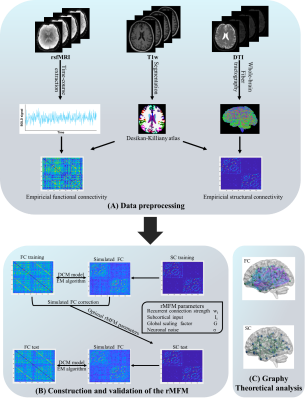 |
Computer Number: 117
4702. Whole-brain
computational modeling reveals disruption of microscale brain
dynamics in Parkinson’s disease
W. Zhao, J. Wang, X. Li, J. Bao, F. Zhang, Y. Zhuang, Y.
Dong, A. Tulupov
Henan University of Science and Technology, LuoYang, China
Impact: The findings underscore the value of multimodal
dynamic modeling in the PD research, providing insight into
altered brain dynamics and network topology associations.
This approach could inform future studies on
neurodegenerative disease mechanisms, potentially aiding
early diagnosis and targeted interventions.
|
|
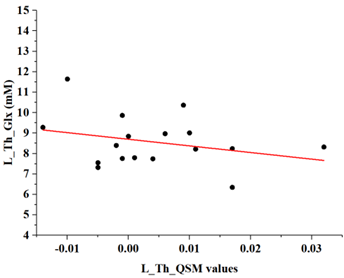 |
Computer Number: 118
4703. Iron
Deposition and Metabolic Correlates in the Midbrain and Thalamus
in Parkinson's Disease
Q. Cheng, W. Su, J. Xin, K. Zhang, F. Xue
Department of Radiology, Qilu Hospital of Shandong University, Qilu Medical Imaging Institute of Shandong University, Jinan, China
Impact: This finding may clarify the neuronal loss and
metabolic dysregulation in the thalamic region during the
progression of Parkinson’s disease, providing new biomarkers
for monitoring disease advancement.
|
|
 |
Computer Number: 119
4704. Exploring
functional segregation in individuals with Parkinson’s disease
with mild cognitive impairment
N. Chaurasiya, T. Davis, G. Rathi, J. Caldwell, Z. Mari, V.
Mishra
University of Alabama at Birmingham, Birmingham, United States
Impact: Our study demonstrates the potential of
resting-state functional-MRI as a potential neuroimaging
technique for diagnosing mild cognitive impairment in
Parkinson’s disease. Our findings highlight their role in
diagnostic accuracy offering insights into brain activity
and connectivity associated with cognitive decline.
|
|
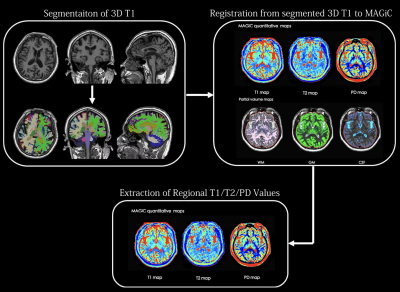 |
Computer Number: 120
4705. Correlation
between T1/T2 mapping and cognitive impairment in Parkinson's
disease based on Magic MRI quantitative imaging technique
R. Zhang, M. Chen, L. Xie, W. Wang, G. Zhang
Hulunbuir people’s hospital, Hulunbuir, China
Impact: This study provides an objective imaging
biomarker for cognitive impairment in Parkinson's disease,
enhancing early detection and aiding in the development of
personalized therapeutic strategies to manage PD-associated
cognitive decline more effectively.
|
|
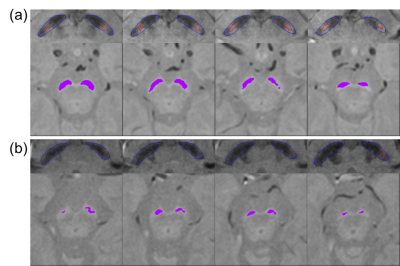 |
Computer Number: 121
4706. Automated
Segmentation of Neuromelanin and Nigrosome for Parkinson's
Disease Diagnostic Assessment
H. Heo, J. Jo, M. Lee, I. Shin, M. Kim, S. Chung, S. Kang,
S. Song
Heuron, Co.Ltd, Seoul, Korea, Republic of
Impact: Combining neuromelanin data with nigrosome
volume information enhances its utility for disease
classification. Neuromelanin demonstrates a meaningful
correlation with the standardized uptake value ratio of
basal ganglia subregions.
|
|
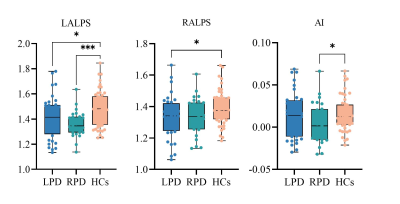 |
Computer Number: 122
4707. Diffusion-Tensor
MRI Study of the relationship between glymphatic system
asymmetry and onset lateralization in Parkinson's disease
Z. Li, X. Miao, P. Ji, Y. Jia, M. Wang
The First Affiliated Hospital of Nanjing Medical University, Nanjing, China
Impact: This study provides insights into the expected
symptom profile of PD patients with different onset sides,
allow for improved accuracy in predicting disease
progression and outcomes, and potentially enable
personalized treatments for PD in the future.
|
|
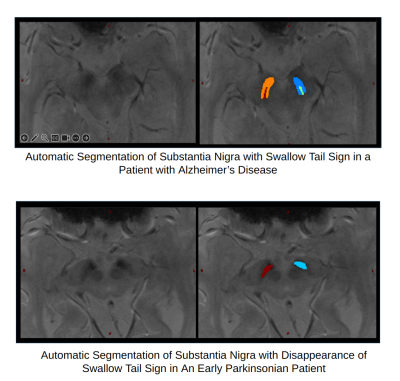 |
Computer Number: 123
4708. NigrosomeNet:
An Automatic Framework to Quantify Nigrosomal Neurodegeneration
in Substantia Nigra Using Deep Learning
S. Mishra, I. Jankovic, P. Bhat, R. Bendrihem, T. Gandhi, S.
Kumaran, S. Lehéricy, N. Villain, A. Kas, N. Pyatigorskaya,
R. Gaurav
Indian Institute of Technology, Delhi, India
Impact: NigrosomeNet provides a rapid, reliable, and
rater-independent solution for N1 analysis, enhancing
diagnostic accuracy in clinical settings. This tool could
significantly streamline neurodegenerative disease
management, support large-scale studies, and reduce the need
for specialized training, making early diagnosis more
accessible.
|
|
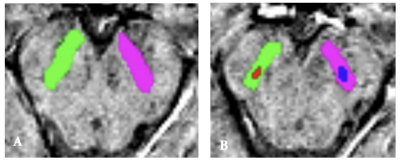 |
Computer Number: 124
4709. Quantitative
assessment of Nigrosome-1 volume and susceptibility in
Parkinson’s Disease
M. De Maria, I. Chimento, U. Sabatini, M. C. Bonacci, J.
Buonocore, F. Aracri, A. Quattrone, A. Quattrone, M. E.
Caligiuri
Neuroscience Research Center, Magna Graecia University, Catanzaro, Italy
Impact: These results support the need to integrate
visual assessment of N1 with a quantitative assessment of
its structure and susceptibility properties to better
characterize PD pathology
|
|
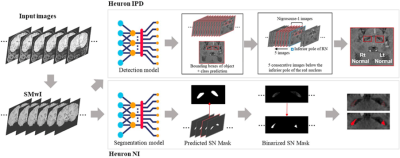 |
Computer Number: 125
4710. Impact
of Nigrosome-1 MRI and Deep Learning Models in Parkinsonism:
Clinical Follow-up At Year-3
D. Patidar, S. Hartono, P. C. Seow, W. Lee, B. M. Tan, K. C.
Lim, R. Chen, E. K. Tan, L. L. Chan
Duke-NUS Medical School, Singapore, Singapore
Impact: Nigrosome-1 MRI in the radiologic clinic aids in
differentiating idiopathic Parkinson’s disease from
non-neurodegenerative conditions when clinical presentation
is unclear. Deep learning models enhance accessibility and
show good potential as objective adjunctive imaging tools
easing radiological workflow for accurate diagnosis.
|
|
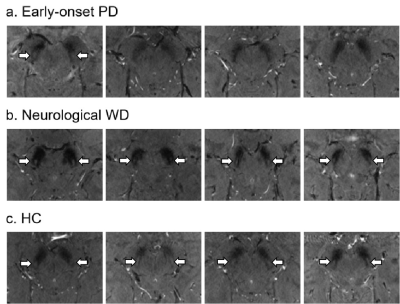 |
Computer Number: 126
4711. Dorsal
Hyperintensity and Iron Deposition Patterns in the Substantia
Nigra of Early-Onset Parkinsonism: A 7T MRI Study
D. Su, Z. Zhang, Z. Zhang, R. Yan, T. Yao, W. Zhu, N. Wei,
Y. Suo, X. Liu, H. Zhao, Z. Wang, H. Ma, W. Li, Y. Li, J.
Lam, J. Zhou, T. Wu, J. Jing, T. Feng
Department of Neurology, Beijing Tiantan Hospital, Capital Medical University, Beijing, China
Impact: The DNH abnormality could aid the diagnosis of
EOPD and its differentiation from NWD with parkinsonism. The
DNH abnormality may be related to predominant iron
deposition in the dorsal and posterior substantia nigra in
EOPD.
|
|
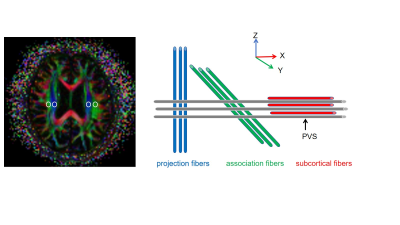 |
Computer Number: 127
4712. Evaluation
of brain glymphatic system function in patients with primary
Parkinson's disease with anxiety based on DTI-ALPS technique
L. Sa, B. Wang, C. Cheng, Y. Wang, M. Chen
Department of MRI,The Affiliated Hospital of Kunming University of Science and Technology, Kunming, China
Impact: The
DTI-ALPS technique shows promise as an imaging biomarker for
early diagnosis and monitoring of glymphatic dysfunction in
PD, potentially aiding in personalized assessment and
management.
|
The International Society for Magnetic Resonance in Medicine is accredited by the Accreditation Council for Continuing Medical Education to provide continuing medical education for physicians.